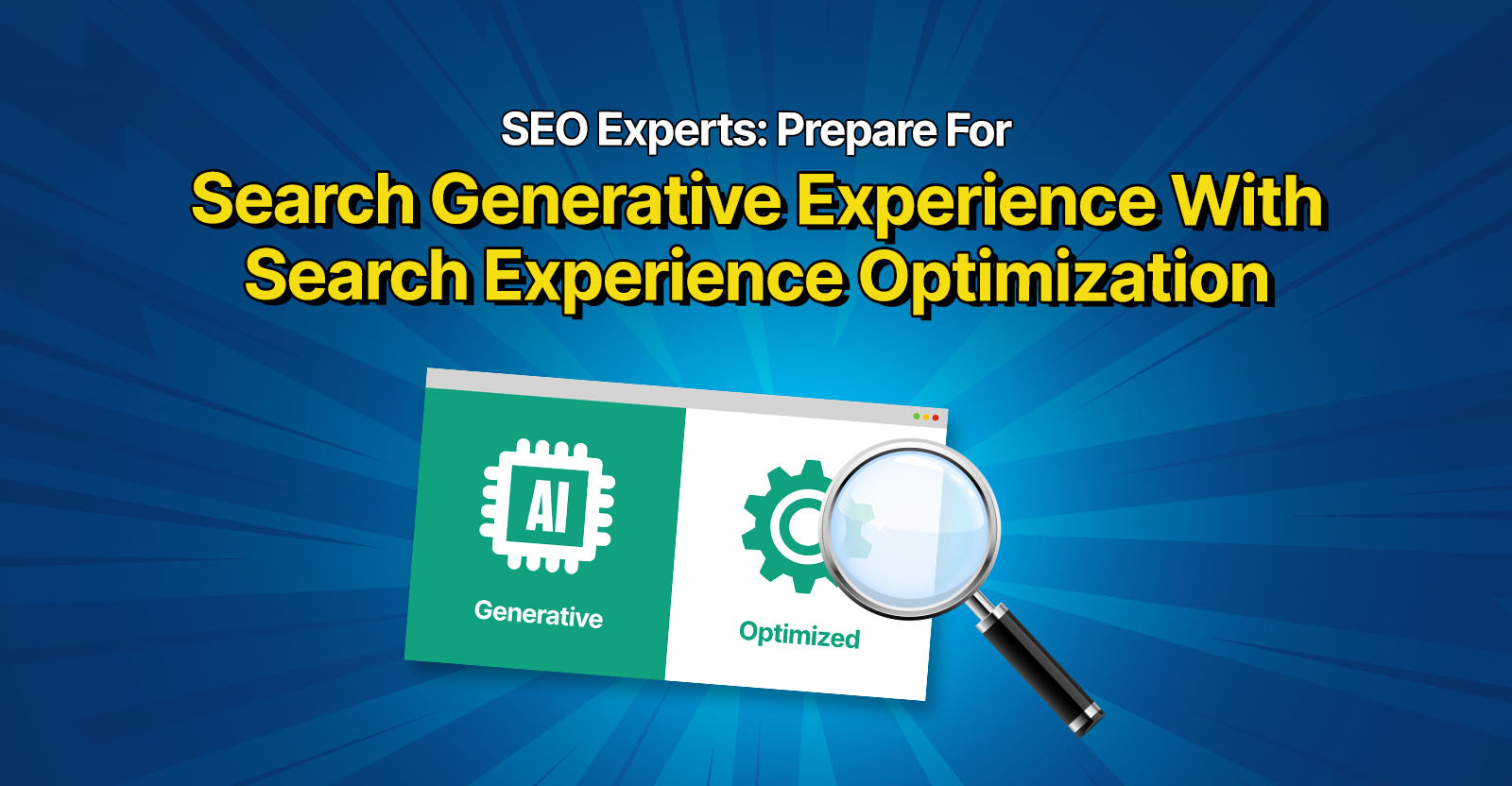This is an excerpt from SEJ’s SEO Trends 2024 ebook, our annual roundup of expert opinions on what you can expect over the course of the next 12 months.
At the time of writing, Google’s “Search Generative Experience (SGE)” is still experimental. There’s much anxiety about what the in-platform chatbot will mean for SEO results, traffic, and revenue if SGE becomes part of the default Google experience.
It seems as though a public rollout of SGE may be indefinitely delayed, but that doesn’t mean you shouldn’t prepare for it.
Only time will tell the (SEO) impact of user-facing AI features in search engines.
Many platforms are introducing new features that keep users on the platform – by giving the information they’re seeking right there (remember when the featured snippet first became a thing?) – rather than redirecting them to websites.
On the other hand, users will always take journeys off-platform when needed. Identifying when to serve the user an ideal in-platform experience and when to coax them off will be crucial to success for both the platforms and you.
Don’t work at cross-purposes with user intent. If they want a quick answer, you won’t get them away from the path of least resistance.
But if the user wants original data, original thoughts, products, or complex solutions, you have opportunities to set yourself apart.
Your ability to choose when to be an ally to generative AI and when to be its enemy could be the key to surfacing your brand for multiple search intents and types.
If I had to summarize these insights in three sentences, they would be:
- AI in search will upset performance for entire groups of queries, data gathering, and potentially the balance between the platforms.
- Search success may come down to being discoverable by generative AI and finding as many opportunities as possible to surface your brand to users.
- Humans are irreplaceable for setting SEO strategies in a new AI landscape and will be for some time.
Optimize For In-Platform Experiences
Andrew Chadwick, Founder, Keyword Insights

As the digital landscape evolves, SEO professionals should take note of the growing shift from traditional search engine optimization (SEO) to search experience optimization (SXO).
Optimizing In-Platform Experience
While, historically, SXO revolved around enhancing website user experience, it now includes optimizing content for the precise platforms where your audience resides.
This evolution underscores the importance of grasping user behaviors on platforms such as TikTok, Instagram, and Pinterest while fine-tuning the overall user experience.
As Google strives to retain user engagement within its ecosystem, businesses and SEO professionals must focus on creating content meticulously designed for these platforms.
This is especially pertinent as Google (and SGE) increasingly integrates a diverse and dynamic content blend into search results, evident by the prominence of TikTok entries.
AI-Powered Content Generation
AI for content generation will become more prevalent in 2024. While AI can assist in creating content efficiently, SEO professionals and businesses should use it judiciously.
To maintain authenticity, they should balance AI-generated outputs with personal experiences, original thoughts, and unique insights.
Leveraging AI tools can help save time at specific points during the content process.
Building A Strong Brand Presence
Building a strong brand presence is crucial in a landscape where Google’s SERPs evolve rapidly.
Recognizable brands could be more likely to attract clicks, and they can fare better in being surfaced by generative AI.
SEO professionals and businesses should invest in brand-building initiatives, collaborate with influencers, provide exceptional customer experiences, and consistently deliver valuable content.
A strong brand can help mitigate the impact of algorithm changes and promote sustained visibility and growth.
These trends reflect the evolving nature of SEO, where the focus is shifting from merely optimizing for search engines to optimizing for the holistic search experience and user preferences.
Businesses that adapt to these trends will likely achieve greater success in their SEO efforts in 2024 and beyond.
The “10 Blue Links” SERP Is A Thing Of The Past
Eli Schwartz, Growth Advisor, Product Led SEO

Search Generative Experience (SGE) may change the whole medium of search.
No longer will SEO be about 10 blue links or a map result.
Developing “search experiences” could overturn the entire process of how people use search to discover information on the internet. Whether users will like this is unclear, but that won’t matter because everything about search is changing.
These developments will be good for some, bad for others, but certainly different for everyone.
On a related note, a shifting search experience might also cause a change in market share dynamics. Could users migrate to ChatGPT? Will they go to Bing? Things can always evolve.
These are the things we need to consider in 2024. Unlike past years, where you could clearly see the direction search was heading, it’s different this time.
Once this Pandora’s box opens, anything can happen.
The Human Element Of SEO May Be Irreplaceable, But We Must Prepare For AI In Search
Olga Zarr, SEO Consultant, SEOSLY

The most significant trend for SEO in 2024 will be the continuation of the rapid growth and influence of AI technologies, such as ChatGPT, Bing Chat, and Bard.
With developments like GPT-4, DALL•E-3, and PaLM 2, it’s clear that this trend will accelerate for a while.
A Significant Shift In Search
These advanced tools are significantly transforming the SEO landscape, and – whether we like it or not – they are pushing us toward a more automated approach.
These changes raise an essential question: Is the SEO as we know it today on the brink of becoming obsolete? It’s unlikely to disappear overnight, but we can’t ignore the current substantial shifts.
Major search engines like Google (through Search Generative Experience) and Bing (through Bing Chat) are increasingly integrating AI-generated content into their search results. This is one of the most significant transformations we’ve seen in decades.
As SEO professionals, it’s crucial that we stay on top of these changes and continuously update our strategies and tools to leverage the power of AI. We must find the perfect balance between utilizing AI for efficiency and relying on our human expertise for nuanced, strategic decision-making.
The Human Element In SEO Is Irreplaceable
Humans bring a level of understanding and analysis that AI cannot replicate – at least for now.
But the SEO field is evolving, and we may not even recognize it in the next five to 10 years. Despite this, the core of our job remains the same: helping businesses connect with their customers.
The tools and platforms might change, but the necessity for skilled AIOs (Artificial Intelligence Optimizers), SEO professionals, or whatever we will be called in the future will remain the same.
We must be prepared to adapt to new methods of SEO and find innovative ways to measure our impact and help our clients gain visibility.
This could mean learning how to showcase our clients’ content in AI-generated search results so that they still stand out in this new landscape.
The rise of AI in SEO is a trend you cannot ignore. It presents challenges and opportunities, and it’s up to us to navigate these waters.
The SEO landscape is changing rapidly, and our methods in 2024 and beyond will need to evolve – or we and our services will become obsolete.
Search Generative Experience Could Create A Data Gap
Patrick Stox, Product Advisor & Technical SEO, Ahrefs

Challenges With Click Attribution
We will see fewer clicks and less data on clicks and rankings. At least it’s looking that way with Search Generative Experience (SGE).
People are likely going to click through to sites less on many queries.
I don’t think search engines will even give us ranking data [any time soon] for these clicks. Even if they do, it will be muddied, with multiple websites listed for each section.
Challenges With Rank Tracking In SGE
This experience also works only with JavaScript enabled.
Rank trackers traditionally have not rendered or had to wait for results like they will with SGE. The cost of rank tracking for SGE is likely to be much higher.
On the other hand, with more attention to machine learning than ever, 2024 will be when more SEO automation goes mainstream.
It will make SEO professionals’ lives easier and free them from many menial and time-consuming tasks.
More resources:
- How To Build A Future-Proofed SEO Strategy When AI Is Changing SEO
- The Hybrid Human-AI Strategy In The Era Of Google SGE
- How Search Engines Work
Featured Image: Paulo Bobita/Search Engine Journal





![[SEO, PPC & Attribution] Unlocking The Power Of Offline Marketing In A Digital World](https://www.searchenginejournal.com/wp-content/uploads/2025/03/sidebar1x-534.png)